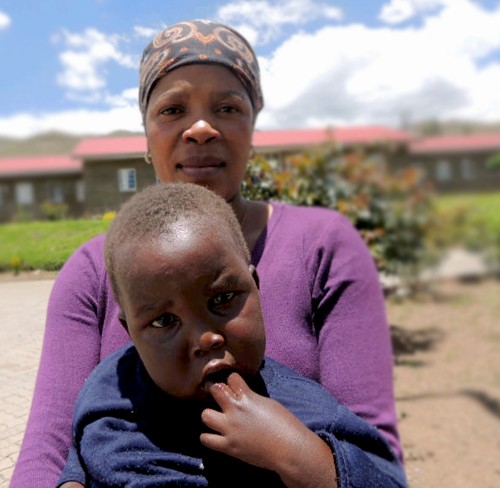
In the rural district of Mokhotlong in Lesotho, Momotaung* wakes up early to prepare for another arduous, two-hour trip to the hospital for her checkup.
On her way, she stops to pick up an elderly neighbor’s grandchild, a 3-year-old orphan named Sabelo* – one of 12 siblings and cousins being cared for by their grandmother. She collects three other children from the village who also need care at the hospital. While this simple act may not appear heroic to some, it provides invaluable support to primary caregivers such as Sabelo’s grandmother and brings to life the adage “it takes a village to raise a child.”
There are over 350,000 orphans in Lesotho, and an estimated 180,000 of them are as a result of AIDS. Nearly half (45 percent) of all households are caring for at least one orphan.
“Our love for orphans and vulnerable children has significantly improved, and that is the reason why I make such a sacrifice,” Momotaung says. She says she has seen changes in her village of Thaba Khubelu because of support from the Lesotho Network of People Living with HIV and AIDS (LENEPWHA), a local organization receiving a small grant through the Building Local Capacity for the Delivery of HIV Services in Southern Africa Project (BLC). BLC is funded by PEPFAR through USAID, and managed by Management Sciences for Health.
Momotaung is a member of Ha re bolaeng khethollo (Let’s kill the stigma) support group. This group of 20 provides home-based care to orphans and vulnerable children and their caregivers. For children living with HIV, the caregivers ensure they have access to and adhere to antiretroviral therapy.
The group used to serve one village, but it now reaches eight. Momotaung attributes the expanded services to training group members received from LENEPWHA on HIV and AIDS, psychosocial support, health referrals and nutrition. Momotaung said before receiving this support, “we did not have patience with our clients, and our capacity to provide care and support was very limited. … There was no organization or individuals who were providing technical assistance and monitoring us, and we were not motivated to do our work.”
The support group has now raised awareness on health and hygiene in the community: “People used to go to traditional healers, but many of them now go to health facilities for treatment of illness,” she said.
LENEPWHA is one of 12 organizations that receives PEPFAR-funded small grants through BLC in Lesotho. The organization provides psychosocial support and skills training to orphans and vulnerable children and their caregivers. Since 2011, LENEPWHA’s work has reached more than 8,500 beneficiaries. To date, BLC has reached 57,223 orphans and vulnerable children and caregivers with services through its partners.
*Full name withheld for privacy reasons.







Comment
Make a general inquiry or suggest an improvement.